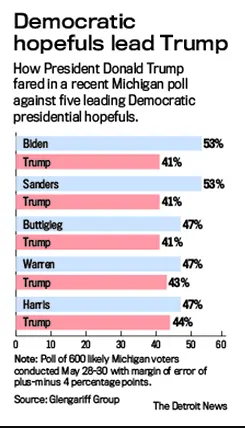In way-too-early polling news regarding the 2020 election from Michigan, a crucial swing state for Donald Trump’s reelection chances, five Democrats lead the incumbent president, with former Vice President Joe Biden and Sen. Bernie Sanders holding decisive 12-point leads.
“Let Trump be Trump. He is unpredictable, of course, but part of that is his appeal for many.”
A strong majority of Michigan voters said while they do not support impeaching Trump because of the findings (namely the lack of findings) in the Mueller report, they will not vote for him — if the election were held today, an important distinction.

About the poll: Glengariff Group paid for and conducted the May 28-30 poll of 600 likely Michigan voters. They are drawn from lists of registered voters, who are screened for whether they say they will likely or definitely vote in the 2020 election. The survey represents a snap shot in time of voters’ views, not a prediction of the 2020 election. Sixty-five percent of likely voters were interviewed by landline phone and the other 35% were surveyed by cellphones in a bid to have proper representation of younger voters. The poll has a margin of error of 4 percentage points, meaning any survey number potentially could be up to 4 points higher or lower than what the survey found. Glengariff surveyed 43% Democrats, 36% Republicans and 19% independents, reflecting Michigan’s historic Democratic Party advantage among registered voters. The survey also sought an accurate representation of the state’s geographical, gender, racial and age balance of voters.
The poll was conducted May 28-30 by Glengariff Group and released to The Detroit News, and surveyed 600 potential voters.
Three other Democrats included in the poll also led Trump, with Indiana mayor Pete Buttigieg holding a 6-point advantage, Sen. Elizabeth Warren, D-Mass., holding a 4-point advantage and Sen. Kamala Harris, D-Calif., holding a 3-point lead.
The advantages held by both Warren and Harris fall within the margin of error of plus-minus 4%, so those are basically a wash at this point.
Three years after Trump became the first Republican to win Michigan since 1988, less than 36% of voters polled say they would vote to reelect him, compared to more than 51% who said they plan to vote for someone new.
Trump won Michigan’s 16 electoral college votes by just 10,704 total votes over Hillary Clinton in 2016, the thinnest margin of any state in the country.
Democratic voters surged to the voting booth for the 2018 midterm elections, helping generate the most state voters in a gubernatorial race since 1962, and they reportedly remain highly motivated to hurt Trump’s chances in 2020, according to pollster Richard Czuba.
“What we saw in Michigan in 2016 wasn’t this giant surge of Trump voters — it was an absolute apathy on behalf of Independents and leaning Democrats to vote (for Clinton),” Czuba said. “We’re seeing the exact opposite heading into 2020.”
Biden, who topped Trump 53% to 41% with 4% undecided, reportedly has strong support among Independents in Michigan.
Biden “is the only candidate for president on either side of the ballot that independents like, and that is a dramatic finding,” Czuba said.
Sanders, a Democratic Socialist, won Michigan’s 2016 primary over Clinton and topped Trump 53% to 41% with 5% undecided, with strong support among male voters and men with a high school degree, a demographic where Trump cleaned up in 2016.
“Sanders has that uniqueness that he kind of disrupts the Trump pattern of less educated male voters,” Czuba said. “Biden exacerbates it.”
Trump campaign communications director Tim Murtaugh predicted the incumbent president “will win Michigan again on the booming economy and on his record of bringing back manufacturing jobs as promised.
“Once voters find out that Democrats support eliminating their private health insurance while also funding health care for illegal immigrants, they will see the choice is clear,” he added.
According to The Detroit News, experts say Michigan will again play an important role in 2020.
“I think Michigan is going to be absolutely critical to the coalition of states that the winning candidate puts together to get to the 270 electoral votes they need,” said Dave Dulio, a political science professor and director of the Center for Civic Engagement at Oakland University. “The Trump campaign is probably going to put a lot of resources into states like Michigan, and Democrats are going to try to get them back.”
Trump polled most poorly among African-American and female voters.
“Southeast Michigan women — we’ve seen this now for a year and a half — continue to be a mammoth problem for the Republican Party,” Dulio said.
Murtaugh said voters turned off by Trump’s personality, Twitter name calling and rhetoric should focus on the president’s beneficial policies.
“Let Trump be Trump. He is unpredictable, of course, but part of that is his appeal for many,” Murtaugh said. “We still hear it at rallies where people still say, ‘You know, here’s a guy who says the things that I think about or say to my friends.’ He is who he is.”
Editor’s note: Yes, we all know Clinton was projected to win in 2016 by nearly every major polling service, but it’s not like they gave Trump a zero percent chance to win. FiveThirtyEight said Trump had a 28.6% chance to win, so better than one in four. With that in mind, will you discount polls until the end of time, or are you concerned by this data out of Michigan (if you are a Trump supporter)? Share your thoughts below.




